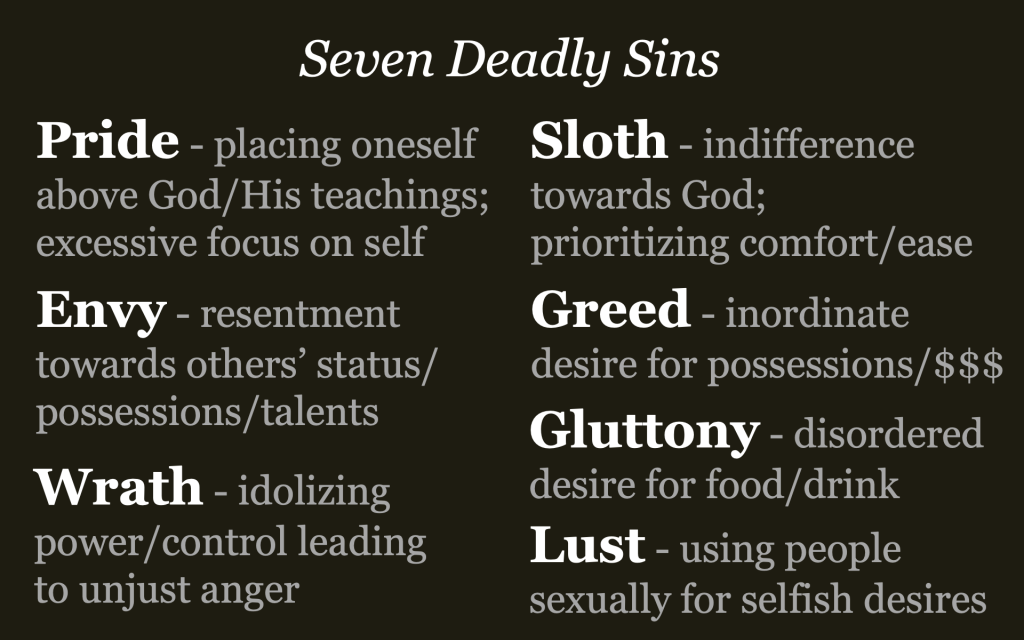Today, let’s talk about the power of conscience. St. John writes, “By this [love] we will know that we are from the truth and will reassure our hearts before him whenever our hearts condemn us” (1 Jn 3:19-20). ‘our hearts condemn[ing] us’ refers to conscience. The strong language is good, because there’s something inside of us that actually judges us: It tells me to be kind to people I find annoying, and it accuses me when I’m impatient with them; it tells me to apologize when I don’t want to apologize.
In 2015, I remember hearing Russell Brand, a British comedian, hedonist, and self-designated sex addict, say that everyone deep down knows that pornography isn’t good for them—this is interesting: A non-Christian man has a sense of something that’s the complete opposite of the way he was raised.
So, why does our conscience tell us things we don’t want to hear? Why doesn’t our conscience just tell us that pornography is good?
Theology tells us that it’s because our conscience has a direct connection with God Himself—this is actually great news. The experience of guilt is a gift, because it means we’re connected to God. Generally speaking, the stronger the guilt we experience, the better, because it’s a sign of a sensitive, healthy conscience.
There are two interpretations of St. John’s words in the Second Reading, the first is longer, the second shorter. He writes, “Let us love, not in word or speech, but in truth and action. And by this we will know that we are from the truth” (1 Jn 3:18-19). Deep down, we know when we’re sincerely following our conscience or making rationalizations. My favourite rationalization is thinking that what I’m doing actually isn’t a sin but is acceptable. St. John is reminding us of the danger of making excuses because this leads us away from God. We’ve all been there: There is a sin we’re stuck in and it bothers us whenever it’s mentioned. For example, here’s a list of the seven deadly sins:
Which one jumps out at you? If you’re like me, you look at one sin first because it’s your weakness and then look to the others in order to forget it. So, we pray: Holy Spirit, please give us the grace to live in the truth and overcome our predominant sin and our rationalizations.
St. John continues, “and will reassure our hearts before him whenever our hearts condemn us for God is greater than our hearts, and God knows everything” (3:19-20). In this first interpretation of the passage, our hearts condemn us rightly. They say: What you’re doing is wrong; go to Jesus’ mercy. And, when we’re honest with Him, His mercy comes to us. His mercy is greater than our sins, and, if we’re trying, He knows it.
And what’s the result? “If our hearts do not condemn us [because we’ve confessed our sins and have reconciled with God], we have boldness before God [which means confidence], and we receive from him whatever we ask, because we obey his commandments and do what pleases him” (3:21). As we follow Jesus in truth and sincerity, we move closer to Him and start receiving all the gifts He wants to give us.
So, our consciences are blessings and tell us when we’re close to God or not. This is in line with St. Ignatius’s first rule of discernment: “In persons who are going from mortal sin to mortal sin, the enemy is ordinarily accustomed to propose apparent pleasures to them… The good spirit uses the contrary method, stinging and biting their consciences through their rational power of moral judgment.” When we’re stuck in mortal sin, God uses the words of the Bible, words at Mass, guilt, and other people to wake us up. God’s saying, ‘You’re not loving Me, others, or yourself.’ So, while guilt doesn’t feel good, it’s a sign that our hearts are close to God and that God hasn’t given up on us!
But the devil does the opposite: He makes us think about having fun and feeling good. He gives us good things, in order to take more: He gives enjoyment but takes away peace, because he’s a liar. It reminds me of what Fr. William Ashley once said. We were talking about problems in the world, and he said, ‘If you ask me, it’s the devil’s fault… bastard.’ That’s actually a true statement because the devil has rejected God as His Father.
So, make note: Whenever we feel guilty about committing a mortal sin, God is close to us, and we need to go to Him in prayer and Confession.
Now here is the second interpretation of the Reading, different but also true: ‘By this we will… reassure our hearts before him whenever our hearts condemn us; for God is greater than our hearts.’ What happens when our hearts falsely condemn us? What happens when we feel worthless, that we should give up, that we’re irredeemable? Do you hear the voice of untruth here, that we should give up? Do you hear the exaggerated statements, that we’re irredeemable? Question: Does discouragement ever come from God? What about just a little? No.
The Second Rule of Discernment says, “In persons who are going on intensely purifying their sins and rising from good to better in the service of God our Lord, the method is contrary to that in the first Rule. It is proper to the evil spirit to bite, sadden, and place obstacles, disquieting with false reasons, so that one may not go forward.” For many people who come to Mass and are trying to follow God, the devil discourages this way: ‘I’ve committed so many mortal sins, I feel horrible. It’s overwhelming and everything just feels too hard.’ And so we don’t pray, don’t go to Mass, don’t go to Confession.
St. John is telling us: When our hearts falsely condemn us, remember the six truths that we discussed three weeks ago: 1) Misery attracts God’s mercy; 2) Our sins are like a drop of water in an immense furnace: that is the proportion; 3) As great as our sins, have confidence in God; 4) Doubting Jesus’ love pains and offends Him the most; 5) I am not always faithful, but I never get discouraged; 6) Jesus wipes every sin from our soul insofar as we trust in His mercy.
St. Ignatius continues: “It is proper to the good spirit to give courage and strength, consolations, tears, inspirations, and quiet… so that the person may go forward in doing good.” Feeling badly about our mortal sins and even tearing up over them is of God when it leads to prayer, Mass, and Confession, because we know we’re loved! And when we receive the Father’s mercy, we love Him more and give His mercy to others!
Today’s homily has been full of possible actions, so take your pick. What is the Holy Spirit saying to us? How is He asking us to respond?
Our conscience is a blessing. Don’t resist it. While the devil offers a little and takes a lot, God’s the opposite: He takes a little so as to give more!
A simple test is this: Whatever’s going on in our hearts, if it leads us away from prayer, Mass, and Confession, resist it—it’s not of God. But, if we feel guilty and it leads us to Jesus, His mercy, and Confession, then follow it—it’s of God.


